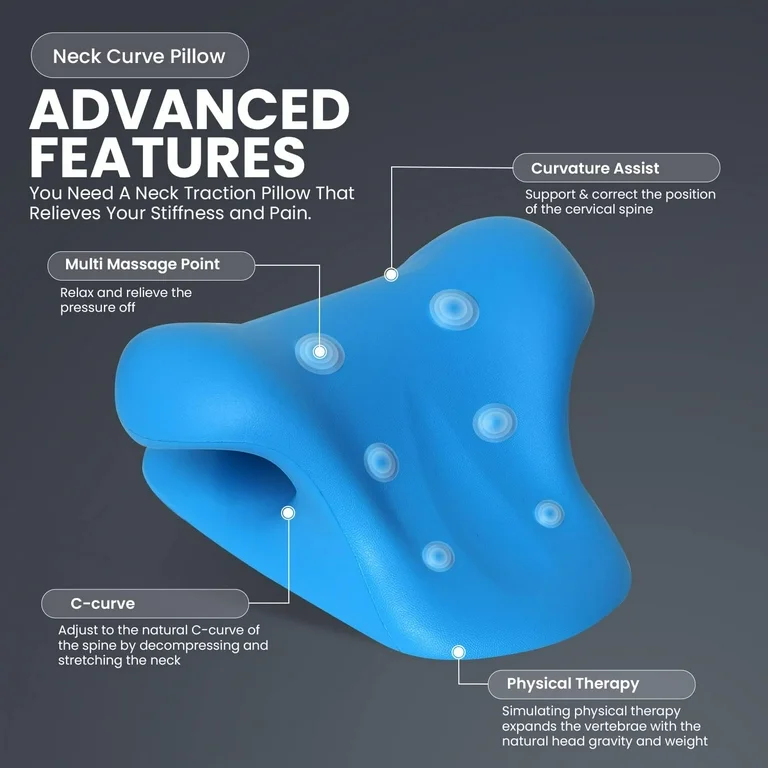Enhance Your Posture and Lower Neck Pain with the Neck Cloud
Enhance Your Posture and Lower Neck Pain with the Neck Cloud
Blog Article
The Impact of Anxiety on Neck Discomfort: Techniques for Reducing Stress and Discomfort
In today's hectic globe, it's clear that stress has ended up being a common consider the start and worsening of neck pain. The detailed connection in between anxiety and muscular tissue tension frequently leaves people looking for relief from the discomfort that follows. By checking out targeted strategies focused on reducing stress and promoting leisure, one can start to deal with the source of neck pain and job in the direction of a more balanced state of health. Join us on a trip to untangle the impact of stress and anxiety on neck discomfort and discover reliable methods to relieve discomfort and enhance general quality of life.
Understanding Stress-Related Neck Pain
Neck pain is a typical complaint that can frequently be credited to stress and anxiety. Stress-related neck discomfort can show up as tension, tightness, or discomfort in the neck and shoulder location. The connection between stress and anxiety and neck discomfort depends on the body's physical feedback to stress and anxiety, which can cause muscle tension and tightness in the neck muscles. Persistent anxiety can bring about consistent neck discomfort and aggravate status quo like cervical spondylosis or muscle pressures.

Identifying Common Tension Areas
Regularly experienced by individuals under stress, tension locations in the body can give important understandings right into the physical indications of emotional pressure. One common tension area is the neck, where stress and anxiety frequently shows up physically. Stress migraines, rigid neck muscular tissues, and restricted range of movement prevail signs of stress-related neck stress. The shoulders are another common area where tension accumulates. Stress can trigger the muscles in the shoulders to tighten, leading to pain and pain. Furthermore, the top back is prone to tension accumulation, particularly in people that experience chronic stress and anxiety. Poor posture and extended sitting can exacerbate tension in this field. The jaw is likewise a typical place for stress-related stress, as lots of people clinch their jaw or grind their teeth when emphasized. Knowing these common tension areas can assist individuals recognize the physical indicators of stress and take steps to address them prior to they intensify right into persistent pain or pain.
Applying Relaxation Methods
Leisure strategies are important devices for decreasing neck discomfort caused by anxiety. In addition, activities like yoga exercise and tai chi integrate both physical movement and leisure, making them reliable techniques for lowering stress and anxiety and neck pain. By integrating these relaxation techniques right into your daily regimen, you can help handle stress degrees, minimize stress in the neck, and reduce discomfort connected with stress-induced neck pain.
Incorporating Self-Care Practices
Incorporating self-care techniques is essential for preserving overall wellness and managing stress-related neck discomfort efficiently. Taking part in regular physical task, such as gentle extending exercises or yoga, can assist ease tension in the neck and shoulders. Practicing great position throughout the day and taking frequent breaks from extended sitting or screen time can additionally prevent stress on the neck muscular tissues.
Additionally, focusing on adequate sleep and establishing a constant sleep routine can add dramatically to decreasing stress levels and promoting relaxation. Developing a soothing bedtime routine, such as reviewing a publication or taking a warm bathroom, can help prepare the mind and body for relaxed sleep. In addition, preserving a well balanced diet plan abundant in nutrients and staying moisturized can sustain total health and wellness and reduce inflammation that might intensify neck discomfort.
Incorporating mindfulness techniques, such as deep breathing exercises or meditation, link can aid take care of anxiety and promote leisure. Requiring time for oneself, participating in hobbies, and establishing limits to protect individual time are also essential elements of self-care that can add to lowering anxiety and alleviating neck discomfort.
Looking For Specialist Assistance
How can individuals successfully resolve persistent neck discomfort that is impacting their every day life and health? Looking for professional assistance can be an essential action in handling and easing neck discomfort. Consulting with medical care specialists such as chiropractic practitioners, physical therapists, or orthopedic professionals can supply important insights and tailored treatment strategies. These professionals can conduct complete assessments to identify the underlying causes of neck discomfort and suggest appropriate interventions.
Chiropractic practitioners focus on back adjustment techniques to enhance alignment and lower tension in the neck area. Physiotherapists provide targeted stretches and exercises to reinforce muscle mass, improve adaptability, and improve overall neck feature. Orthopedic professionals can give sophisticated clinical interventions such as shots or surgical you could try this out options for extreme situations of neck pain.
Verdict

Stress-related neck pain can materialize as tension, rigidity, or discomfort in the neck and shoulder location. The link between anxiety and neck pain exists in the body's physical reaction to stress, which can result in muscular tissue stress and tightness in the neck muscular tissues. Tension migraines, stiff neck muscle mass, and limited range of movement are common symptoms of stress-related neck stress. By incorporating these leisure strategies into your daily routine, you can assist take care of anxiety degrees, reduce stress Visit Website in the neck, and alleviate discomfort associated with stress-induced neck discomfort.

Report this page